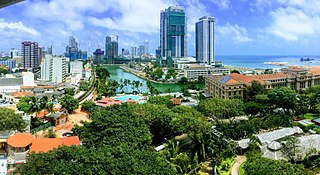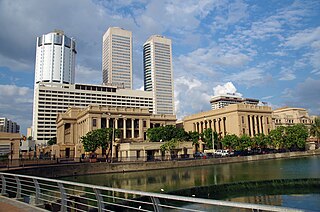
Sri Lanka, historically known as Ceylon, and officially the Democratic Socialist Republic of Sri Lanka, is an island country in South Asia. It lies in the Indian Ocean, southwest of the Bay of Bengal, separated from the Indian peninsula by the Gulf of Mannar and the Palk Strait. It shares a maritime border with the Maldives in the southwest and India in the northwest.

The mixed economy of Sri Lanka was worth $84 billion by nominal gross domestic product (GDP) in 2019 and $296.959 billion by purchasing power parity (PPP). The country had experienced an annual growth of 6.4 percent from 2003 to 2012, well above its regional peers. This growth was driven by the growth of non-tradable sectors, which the World Bank warned to be both unsustainable and unequitable. Growth has slowed since then. In 2019 with an income per capita of 13,620 PPP Dollars or 3,852 (2019) nominal US dollars, Sri Lanka was re-classified as a lower middle income nation with the population around 22 million (2021) by the World Bank from a previous upper middle income status.

Colombo is the executive and judicial capital and largest city of Sri Lanka by population. According to the Brookings Institution, the Colombo metropolitan area has a population of 5.6 million, and 752,993 in the Municipality. It is the financial centre of the island and a tourist destination. It is located on the west coast of the island and adjacent to the Greater Colombo area which includes Sri Jayawardenepura Kotte, the legislative capital of Sri Lanka, and Dehiwala-Mount Lavinia. Colombo is often referred to as the capital since Sri Jayawardenepura Kotte is itself within the urban/suburban area of Colombo. It is also the administrative capital of the Western Province and the district capital of Colombo District. Colombo is a busy and vibrant city with a mixture of modern life, colonial buildings and monuments.
Good governance is the process of measuring how public institutions conduct public affairs and manage public resources and guarantee the realization of human rights in a manner essentially free of abuse and corruption and with due regard for the rule of law. Governance is "the process of decision-making and the process by which decisions are implemented ". Governance in this context can apply to corporate, international, national, or local governance as well as the interactions between other sectors of society.

The Central Bank of Sri Lanka is the monetary authority of Sri Lanka. It was established in 1950 under the Monetary Law Act No.58 of 1949 (MLA) and in terms of the Central Bank of Sri Lanka Act No. 16 of 2023, the CBSL is a body corporate with perpetual succession and a common seal. The Central Bank has administrative and financial autonomy. The CBSL has two main boards in operation, namely, the Governing Board (GB) and the Monetary Policy Board (MPB).
Asoka Milinda Moragoda is a Sri Lankan politician and businessman. He is the current Sri Lankan High Commissioner Designate to India and, former Cabinet Minister and Member of Parliament representing the Colombo District from 2001 to 2010, who served as the Minister of Justice and Law Reform (2009-2010), Minister of Tourism (2007–2009); Minister for Economic Reform, Science and Technology and Deputy Minister for Plan Implementation and Development (2002–2004). His last political post was that of Opposition Leader of the Colombo Municipal Council and Senior Adviser to former President Mahinda Rajapakse.

Fort (Colombo) (Sinhala: කොටුව; Tamil: கோட்டை) is the central business district of Colombo in Sri Lanka. It is the financial district of Colombo and the location of the Colombo Stock Exchange (CSE) and the World Trade Centre of Colombo from which the CSE operates. It is also the location of the Bank of Ceylon headquarters. Along the foreshore of the Fort area is the Galle Face Green Promenade, built in 1859 under the governance of Sir Henry George Ward, the Governor of Ceylon (Sri Lanka) during British colonial era. Fort is also home to the General Post Office, hotels, government departments and offices.

Anura Kumara Dissanayake, commonly referred to by his initials AKD, is a Sri Lankan Marxist politician who is the current president of Sri Lanka. Dissanayake was the first elected president in second round of vote counting, after not gaining a majority and the first not from a traditional political camp.
The Committee On Public Enterprises (COPE) is a parliamentary committee established on July 21, 1979, by the Parliament of Sri Lanka.

Corruption in Sri Lanka is considered a major problem in all levels of society, from the top echelons of political power to minor staff levels.
Punchi Banda Jayasundara is a Sri Lankan economist. He was the former Secretary to the President, Gotabaya Rajapaksa and former Secretary of the Treasury on multiple occasions.
Lakshman Arjuna Mahendran is a Sri Lankan-born Singaporean economist and banker. He is a former Governor of the Central Bank of Sri Lanka (CBSL), having been appointed by President Maithripala Sirisena in January 2015 and served until the end of his term on 30 June 2016. He was the former Managing Director of HSBC Private Bank, Chief Investment Officer of Emirates NBD as well as chairman and Director-General of the Board of Investment of Sri Lanka. Mahendran is currently residing in Singapore, which has refused to extradite him on a request from Sri Lanka routed through interpol.
Terrorism in Sri Lanka has been a highly destructive phenomenon during the 20th and 21st centuries, especially so during the periods of the Sri Lankan Civil War (1983–2009) and the first (1971) and second JVP insurrections (1987–1989). A common definition of terrorism is the systematic or threatened use of violence to intimidate a population or government for political, religious, or ideological goals. Sri Lanka is a country that has experienced some of the worst known acts of modern terrorism, such as suicide bombings, massacres of civilians and assassination of political and social leaders. Terrorism has posed a significant threat to the society, economy and development of the country. The Prevention of Terrorism Act of 1978 is the legislation that provides the powers to law enforcement officers to deal with issues related to terrorism in Sri Lanka. It was first enacted as a temporary law in 1979 under the presidency of J. R. Jayewardene, and later made permanent in 1982.

The Sri Lankan economic crisis is an ongoing crisis in Sri Lanka that started in 2019. It is the country's worst economic crisis since its independence in 1948. It has led to unprecedented levels of inflation, near-depletion of foreign exchange reserves, shortages of medical supplies, and an increase in prices of basic commodities. The crisis is said to have begun due to multiple compounding factors like tax cuts, money creation, a nationwide policy to shift to organic or biological farming, the 2019 Sri Lanka Easter bombings, and the impact of the COVID-19 pandemic in Sri Lanka. The subsequent economic hardships resulted in the 2022 Sri Lankan protests. Sri Lanka received a lifeline in the form of an Indian line of credit amounting to $4 billion. This substantial credit infusion served to cover the costs of importing essential goods and fuel. As a result, the foreign currency reserves of debt-ridden Sri Lanka experienced a notable improvement, reaching $2.69 billion.

Hilton Colombo is a Hilton brand five-star luxury hotel in Colombo, Sri Lanka. The hotel is owned by Hotel Developers (Lanka) Ltd. The company was incorporated in 1983 and was listed on the Colombo Stock Exchange in the following year. The hotel was launched in 1987 and the 30th anniversary was celebrated in 2017 with an issuance of a stamp and a first day cover. However, the company is delisted from the stock exchange in 2020 and solely owned by the Government of Sri Lanka, therefore, runs as a state-owned enterprise.

Hilton Colombo Residences is a five-star luxury hotel located in Colombo, Sri Lanka. The hotel was formerly known as JAIC Hilton. The name derived from its initial owner Japan Asia Investment Company, who sold the hotel to Sri Lankan conglomerate, Hirdaramani Group in 2003. It is one of the tallest buildings in Sri Lanka. It is the second Hilton brand hotel in Sri Lanka, while the first was Hilton Colombo.
Arukathu Patabendige Jagath Pushpakumara, commonly known as Jagath Pushpakumara, is a Sri Lankan politician and Member of Parliament.

Kelani Tyres PLC is a tyre manufacturing company in Sri Lanka. Kelani Tyres originates in the privatisation of the government-owned Ceylon Tyre Corporation. Initially, privatisation is met with extreme employee industrial action for several months. Once the employee unrest dwindled, the company entered into an agreement with CEAT to set up a joint venture in 1993. In 1994, Kelani Tyres was listed on the Colombo Stock Exchange. In 2022, CEAT was amongst the 100 most valuable brands in Sri Lanka. The company moved to meet the total domestic demand for bus and truck tyres which would save LKR11 billion in foreign exchange through import substitution.

Kanagasabai Mudalithambi Chellappah, , was a Sri Lankan judicial officer, philanthropist, Tamil and Sinhala linguist scholar who was the pioneer of free library movement in Sri Lanka and laid the foundation for building the Jaffna Public Library. In 1933, he started the first library in Jaffna, through lending books from his home in Puttur, Sri Lanka. This was eventually resulted in the establishment of the Jaffna public library, which was “regarded as among the most remarkable in South Asia and housed about 97,000 books, magazines and old news papers, many of them rare.”











